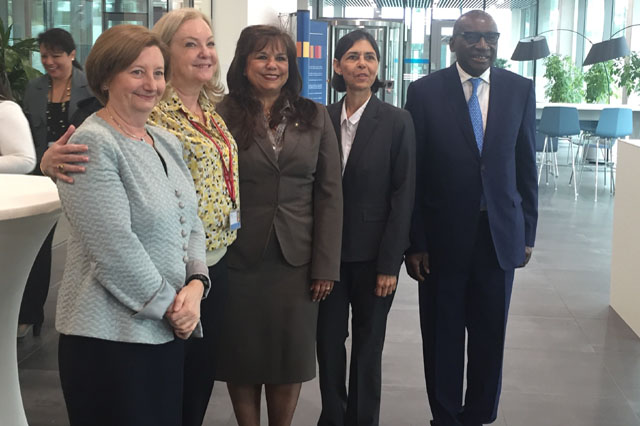
On 2 June 2016, the International Criminal Court (ICC) held a ceremony to welcome El Salvador as the 124th State Party to the Rome Statute of the International Criminal Court.
The ceremony was held in the presence of the President of the ICC, Judge Sivia Fernández, the President of the Assembly of States Parties (ASP), H.E. Sidiki Kaba, ASP Vice-President H.E. Álvaro Moerzinger, a number of ICC Judges and representatives of the Office of the Prosecutor and Registry. The ceremony was also attended by a number of representatives of Embassies from Latin American and Caribbean countries accredited to the Netherlands as well as PGA and CICC secretariat.
ICC President Judge Silvia Fernández welcomed the new State Party, affirming that "the Rome Statute system is now stronger than ever with 124 States Parties, but there is a long way to go to universality. Without universal participation, the Court cannot achieve its global mandate". She highlighted the important role of Parliamentarians for Global Action (PGA) in the ratification process, which resulted in El Salvador joining the system aimed at consolidating the Rule of Law and protection of human rights.
The ASP President Mr Sidiki Kaba welcomed El Salvador as the first country that has ratified both the Rome Statute and the Kampala Amendments at the same time. He noted that by joining the Rome Statute, El Salvador affirmed its will to strengthen the Rule of Law and to contribute to efforts in the fight against impunity and protection of victims of the most serious crimes.
Through a video message, the Minister of Foreign Affairs of El Salvador, H.E. Mr Hugo Martinez, expressed pride for having ratified the Rome Statute as a commitment with the principle of “never again”, declaring that “the International Criminal Court is a guarantee of non- repetition of the sad chapters that we have lived in diverse periods of the history of our country.”
The Ambassador of El Salvador, H.E. Ms Aída Luz Santos de Escobar confirmed the country`s commitment to justice, stating that “we cannot return to the past, we recognise the importance of justice and protection the victims of these grave crimes.” Ambassador Santos also recognized the role played by civil society in particular by CICC and PGA.
PGA's involvement the ratification process of El Salvador
PGA directly contributed to the ratification process by its actions within the Campaign for the Rome Statute of the ICC for Effectiveness and Universality of the Rome Statute launched in El Salvador in 2002. Since then, the campaign for accession to the ICC-system aimed at dissipating misconceptions and fostering consensus among different political groups.
In May 2014, after perceiving a lack of progress on the matter, PGA send an open letter to the then President of El Salvador, H.E. Mauricio Funes, signed by various prominent Latin American PGA members as a way to convince the President to transmit the accession and ratification bills to the parliament. Two weeks after the open letter was sent and distributed by the local press the accession and ratification bills were submitted to Parliament for discussion. On the 23 and 30 June, the Legislative Assembly of El Salvador and PGA jointly organized two Expert Seminars on the Rome Statute and its implementation.
PGA organized another field mission in July 2015, following the parliamentary elections, with the aim of sensitizing the newly elected members of parliament to the importance and relevance of the Rome Statute system. Following this event, the 4 main political groups in El Salvador participated in a Special Session on the Ratification and Implementation of the Rome Statute co-organized with the Parliament of Costa Rica. In September 2015, PGA organized a multiparty visit of Salvadorian MPs to the ICC to address any remaining concerns or misunderstandings.
On 24 November 2015, the Foreign Relations Commission approved the accession and ratification bills. On 26 November the Legislative Assembly voted in favor of accession to the Rome Statute, paving the way for El Salvador to become the 124th State Party to the ICC. A PGA Delegation led by the Secretary-General and integrated by the PGA Legal Advisor, witnessed this historic vote and met with all political groups.
On 30 November and 1 December 2015, the Parliament of El Salvador hosted the 37th Annual Forum of PGA on the role of Parliamentarians in promoting international peace and security.
On 3 March 2016, El Salvador had deposited its instrument of accession to the Rome Statute of the International Criminal Court, and the instruments of ratification of the amendments to the Rome Statute on war crimes and on the crime of aggression. The deposits by El Salvador have brought the number of States Parties to the Rome Statute to 124, to the Kampala Amendments on war crimes to 30, and to the Kampala Amendments on the crime of aggression to 28.

